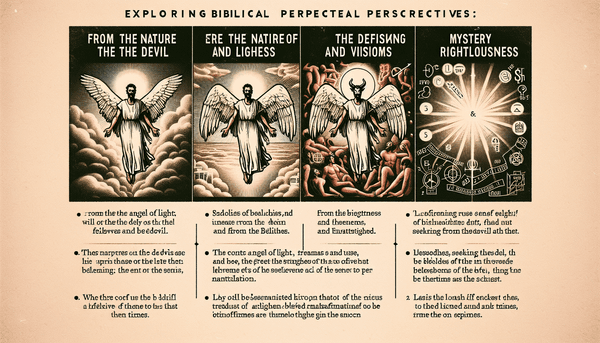Developing and Recognizing a Relationship with God
Having a relationship with God is a deeply personal experience, characterized by communication through prayer and a commitment to living in obedience to His commandments. The Bible encourages us to pray without ceasing (1 Thessalonians 5:17) and to align our lives with God's teachings. As we draw near to God, He draws near to us, a promise found in James 4:8, 'Draw near to God, and he will draw near to you.' This growing relationship is marked by signs such as experiencing God's peace and a desire to keep His commandments, as 1 John 2:3 states, 'And by this we know that we have come to know him, if we keep his commandments.' This personal relationship fosters a profound sense of His presence and guidance in our lives.
Wealth, Humility, and the Christian Perspective
Within the Christian faith, wealth and status are seen as transient, with true value found in one's relationship with God. The Bible cautions against finding security in material possessions and encourages humility, especially for the wealthy. In the words of Jesus, 'Do not store up for yourselves treasures on earth, where moths and vermin destroy, and where thieves break in and steal' (Matthew 6:19-21). Instead, we are urged to find our identity in spiritual wealth. The apostle James speaks to the lowly brother boasting in his exaltation (James 1:9-11), reminding us that our high position is found in humble circumstances and in our status as children of God, not in our earthly wealth or achievements.
Conclusion
As we journey through life, the Biblical principles of free will, the pursuit of education, enduring trials, understanding wealth, and knowing God offer invaluable guidance. By integrating these truths into our daily decisions and relationships, we can navigate the complexities of life with grace and wisdom. In our quest for spiritual fruitfulness, it is essential to make choices that honor God, much like how choosing edifying television shows can reflect our commitment to living by biblical teachings. Let us take to heart the lessons found in scripture, allowing them to mold our character and actions. May we seek wisdom, draw near to God, and embrace the fullness of life that comes from walking in His ways, always remembering the words of Proverbs 9:10, 'The fear of the Lord is the beginning of wisdom, and the knowledge of the Holy One is insight.'
FAQ
Q: Can God deny me from going to school?
A: There is no specific scripture that addresses the question of God denying someone from attending school. The decision to attend school is within the realm of human choice, guided by prayer and seeking God's will.
Q: How do I know that I have a relationship with God?
A: One way to know that you have a relationship with God is through prayer and communication with Him. A growing desire to align your life with God's teachings and commandments, and a sense of His presence and peace in your life are also indications of a relationship with Him.
Q: What does the Bible say about the importance of faith when approaching God?
A: The Bible emphasizes the importance of faith and belief when approaching God in prayer. James 1:6 says, 'But when you ask, you must believe and not doubt, because the one who doubts is like a wave of the sea, blown and tossed by the wind.'
Q: What does the Bible say about the wisdom and knowledge of God?
A: The Bible speaks of God's wisdom and knowledge as surpassing all earthly understanding. Isaiah 55:8-9 illustrates the incomprehensible wisdom and knowledge of God, stating, 'For my thoughts are not your thoughts, neither are your ways my ways, declares the Lord.'






